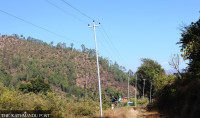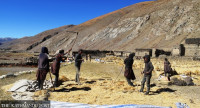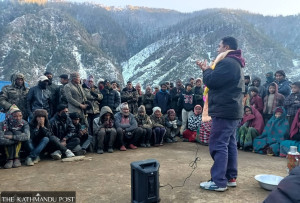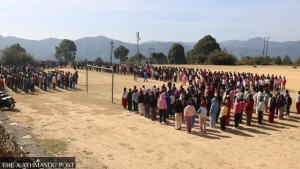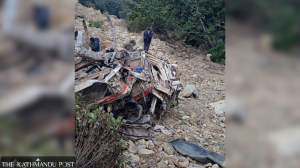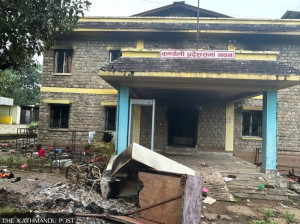Karnali Province
Upper Dolpa medical emergencies are marred by high costs and delays
People in the isolated mountain region are forced to rely on costly helicopter evacuations that require special permissions and are often delayed by red tape.
Ramchandra Neupane
Dawaphuti Gurung, aged 59 of ward 3 of Dolpobuddha Rural Municipality in Dolpa fell critically ill last week following heart-related complications. She had been suffering from heart ailments for some time. After her condition suddenly worsened, local health workers advised that she be taken to a well-facilitated hospital outside the district for emergency treatment.
Dharke Gurung, a health assistant who recommended that she be medevaced, said the patient’s condition had become critical. “I work at a health clinic run by Vision Dolpo. After providing primary care, we referred her for further treatment,” he said. “Neither our clinic nor the local health post can handle serious or complicated medical cases. Government health staff are rarely present, which is why our organisation has set up a separate clinic.”
According to Dharke, Dawaputi remained at her home for two days while family members and local health workers tried to provide care throughout the night. When her condition did not improve, she was finally advised to seek treatment outside the district.
Along with her, 49-year-old Pamba Gyaljung Lama of Kalang in ward 8 of Shey-Phoksundo Rural Municipality in the district, was also in need of urgent medical attention due to severe leg injuries. While travelling from Saldang towards Dho, both of her legs had suffered frostbite. With the conditions of both patients becoming serious, they needed to be rescued immediately and taken to a well-equipped hospital.
Their families then appealed to the Dolpobuddha Rural Municipality for a helicopter evacuation. On November 18, the rural municipality wrote to Simrik Air, requesting assistance in rescuing both patients. At the time, a Simrik Air helicopter was operating in Shey-Phoksundo, transporting equipment for a solar mini-grid project.
Despite the municipality’s request and the proposal to carry out the rescue at a reasonable rate, the helicopter company initially ignored the appeal. Simrik Air only sent a letter to the District Administration Office in Dolpa seeking permission at 3 pm requesting permission for the rescue.
According to Chief District Officer Bhimraj Koirala as soon as the Simrik request arrived, his office forwarded a request to the Home Ministry for flight authorisation. Approval was granted shortly thereafter. Koirala said that had the helicopter company sought permission on time, the ministry could have issued clearance within an hour. By the time the administrative process was completed, it was already 4 pm.
Under the rules of the Civil Aviation Authority Nepal, helicopter flights are not permitted after 5 pm. As a result, it was no longer possible for the helicopter to fly that day, and the rescue could only be carried out on November 19 when the patients were airlifted to Jufal Airport.
“We had asked Summit Air two days earlier for tickets because the patient was in critical condition, but they refused, saying seats were not available,” said Kyalpo Thapa Bhote of Dolpobuddha Rural Municipality. “These are complicated medical emergencies, yet even when we requested tickets in advance, we could not secure them.”
Since tickets were not available that day, Dawaphuti was eventually flown to Nepalgunj the following morning on a Sita Air flight—but at a higher fare. “The normal fare from Dolpa to Nepalgunj is around Rs 7,000, but that day we were charged Rs3,000 more,” he complained.
Although Dolpa, a remote mountain district in Karnali Province, was connected to the national road networks some seven years ago, its northern part, upper Dolpa, has no road access. The locals in upper Dolpa continue to face life-threatening delays and heavy financial burdens when medical emergencies arise.
While the southern parts of Dolpa can reach the district headquarters in Dunai by road, the three local units of upper Dolpa—Dolpo Buddha, Shey-Phoksundo and Chharkatangso—are still without roads. For residents, reaching Dunai still requires four to five days of walking across harsh terrain, resulting in severe obstacles to timely treatment.
Pregnant women, postpartum mothers, and patients with serious medical complications are hit hardest when they need immediate evacuation. Apart from a few health posts, the region has no properly equipped hospitals. In many cases, even patients injured in accidents must first reach Dunai, the district headquarters, just for basic treatment.
In geographically isolated upper Dolpa, helicopter rescue is the only option for critically ill patients. “Families must spend hundreds of thousands of rupees to charter a helicopter, and then they have to wait a long time for flight approval from the Home Ministry. This delay puts patients at risk,” said Bhote. “If rescue in remote areas could be authorised only by the local government or administration, the process would be much faster," he added, citing the incident of the November 19 rescue.
Simrik Air charged Rs252,000 to fly Dawaputi and Pamba from Dho to Dunai. Families complained that even though the helicopter was already in Shey-Phoksundo transporting equipment, they still had to pay high charter rates. According to Chhirang Samduk Gurung, Dawaphuti’s son-in-law, he paid Rs152,000 for her evacuation, while the other family paid the remaining amount. “She is currently receiving treatment at Shahid Gangalal National Heart Centre in Kathmandu and remains in critical condition. Four years ago, too, we had to charter a helicopter from Tingje, paying Rs 450,000 for her rescue. She is a widow and lives alone,” he said.
Due to their weak economic situation, families previously had to take loans to pay for air rescues. He added that when road travel to the district headquarters is not possible, families have no option but to hire a helicopter paying enormous costs. They also complain that when helicopters fly into restricted airspace [upper Dolpa], security personnel are assigned on board, meaning patients’ caretakers are sometimes left behind due to limited space.
For upper Dolpa residents, chartering a helicopter to Kathmandu can cost up to Rs 1 million. Locals complain that even those who own property or a steady income often struggle to afford emergency evacuation. “Travelling by road to Dunai with a patient can take up to a week, and a critically ill patient may not survive the journey,” said Pema Chewang Gurung of Dolpobuddha. “Even if it means taking loans, there is no choice but to call a helicopter.”
The government currently provides helicopter rescue for pregnant women and new mothers under the President’s Women Upliftment Programme. However, locals have urged the government to introduce free emergency air evacuation for all seriously ill patients, not only mothers and newborns.




 10.12°C Kathmandu
10.12°C Kathmandu




